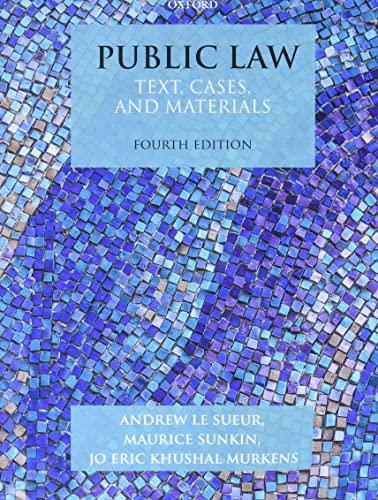Question
Part A - Principles of precedent Donoghue v Stevenson [1942] AC 562 is arguably one of the most renowned of all legal cases. If you
Part A - Principles of precedent
Donoghue v Stevenson [1942] AC 562 is arguably one of the most renowned of all legal cases. If you would like to read the original judgment, you can visit this UK link. http://www.leeds.ac.uk/law/hamlyn/donoghue.htm Read Grant v Australian Knitting Mills Ltd [1936] 54 CLR 49 by accessing www.austlii.edu.au and searching for the case.
Answer the following questions:
1. Explain in your own words the main features of the doctrine of precedent (ensure you include an explanation of the terms 'ratio decidendi' and 'obiter dicta').
2. Explain how the High Court of Australia in Grant v Australian Knitting Mills Ltd [1936] 54 CLR 49 considered and/or applied the legal principle set by a Donoghue v Stevenson.
3. Explain the final outcome of this application of the doctrine of precedent.
Part B - Statutory Interpretation
Read the following scenario.
Mary Smith has instructed as follows: She was attending a party at work - the Azure Beach Library Annual Party for Book Week. Upon leaving the party at around 9:00pm, she saw her ex-boyfriend's vehicle parked down the street. She has been extremely angry at him as he has left her with numerous unpaid bills that she cannot afford. She instructs that her anger got the better of her and she repeatedly smashed his Mercedes vehicle with a large rock she found in a nearby garden. This caused over $50,000.00 in damage. Police officers arrested Mary at the scene. They took her to the Azure Beach Police Station where they prepared the charge papers. These were submitted to the Supervising Sergeant, who then decided to grant bail, however this was conditional bail. Details of conditional bail were:
being of good behaviour;
not approach ex-boyfriend within 50m;
not contact ex-boyfriend.
A colleague, Mr George Smilie witnessed the incident.
Mary instructs that she has no criminal history. This is her first offence. She consumed four drinks throughout the evening which lasted three hours. She claims her usual clear thinking was effected by the alcohol. Mary has been charged with breach of section 195(1) of the Crimes Act 1900 (NSW). This section can be accessed at: http://www.austlii.edu.au/au/legis/nsw/consol_act/ca190082/s195.html
Answer the following question:
1. Identify and explain the steps of statutory interpretation.
2. Apply the steps of Statutory Interpretation to determine whether you would advise the client that a court is likely to make a finding of guilt or not?
Step by Step Solution
There are 3 Steps involved in it
Step: 1

Get Instant Access to Expert-Tailored Solutions
See step-by-step solutions with expert insights and AI powered tools for academic success
Step: 2

Step: 3

Ace Your Homework with AI
Get the answers you need in no time with our AI-driven, step-by-step assistance
Get Started


